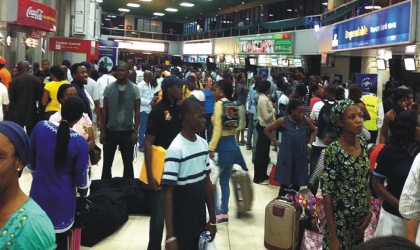Oil & Energy
Subsidy Removal: ‘We Won’t Increase Fares’

Cab operators at the
Murtala Muhammed International Airport, Lagos, have assured commuters that they would not hike transportation fares, following the removal of fuel subsidy by government.
General Secretary, Airport Cab Operators, Mr Olalekan Agboola, gave the assurance while speaking with newsmen in Lagos on Thursday.
The government had on Wednesday announced the removal of subsidy for petroleum importation which increased the pump price from N86.50 per litre to N145 per litre.
However, Agboola said the association had no plan to increase fares, adding that the normal N100 and N150 fares charged for a journey to and from Ikeja would remain.
He said: “we cannot increase our fares because everybody knows how the country is now.
“We have been on ground to monitor the situation and things are still the way they were before the announcement.
“The fare is still the same. There is nothing we can do if the government refuses to revert to the old pump price. We can’t raise our fares over the issue.”
Agboola noted that the President Muhammadu Buhari-led administration had valid reasons for removing the subsidy, but pleaded with the government to consider its impact on the lives of Nigerians.
Oil & Energy
NERC, OYSERC Partner To Strengthen Regulation

Oil & Energy
NLC Faults FG’s 3trn Dept Payment To GenCos

Oil & Energy
PENGASSAN Rejects Presidential EO On Oil, Gas Revenue Remittance ……… Seeks PIA Review

-

 News2 days ago
News2 days agoAmend Constitution To Accommodate State Police, Tinubu Tells Senators
-

 Politics2 days ago
Politics2 days agoSenate Urges Tinubu To Sack CAC Boss
-

 News2 days ago
News2 days agoDisu Takes Over As New IGP …Declares Total War On Corruption, Impunity
-
Business2 days ago
President Tinubu Extends Raw Shea Nuts Export Ban To 2027
-
Business2 days ago
Crisis Response: EU-project Delivers New Vet. Clinic To Katsina Govt.
-
Business2 days ago
President Tinubu Approves Extension Ban On Raw Shea Nut Export
-
Sports2 days ago
NDG: Rivers Coach Appeal To NDDC In Talent Discovery
-
Rivers2 days ago
Etche Clan Urges Govt On Chieftaincy Recognition

